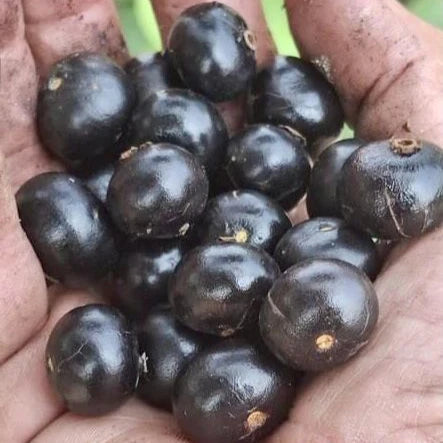Love it? Add to your wishlist
Your favorites, all in one place. Shop quickly and easily with the wishlist feature!
[message]
[title]
[message]



Veliyath Gardens
Couldn't load pickup availability
Botanical Name: Neomitranthes obscura
Common Names: Pitanga de Cachorro (Brazil), Dog Cherry, Wild Cherry of São Paulo
Neomitranthes obscura is a rare member of the Myrtaceae family, native to the lush Atlantic coastal rainforests of São Paulo and Rio de Janeiro in Brazil. Often found growing in humid, semi-shaded forest margins, this shrub-to-small tree has evolved with resilience and adaptability. Its naturally compact form and elegant branching habit make it a favorite among tropical plant collectors and urban gardeners seeking beauty and fruit in a limited space.
Though not widely known outside Brazil, Pitanga de Cachorro is slowly gaining recognition for its unique flavor, manageable size, and cultural relevance. Its name—translated as “Dog Cherry”—derives from traditional beliefs associating the fruit with wild foraging and medicinal use in rural regions.
Grows up to 2–3 meters, perfect for pots and balcony gardening
Forms a dense, well-rounded crown with lush, dark green foliage
Produces small, globular fruits (1.5–2 cm), purple-black when ripe
Blossoms are delicate, white, and subtly fragrant
Bark is smooth, and young branches have a soft reddish tint
The tree’s manageable size, quick growth rate, and aesthetic appeal make it a suitable candidate for ornamental and edible landscaping, especially in patios, urban gardens, and tropical greenhouses.
The fruits of Pitanga de Cachorro resemble miniature jaboticabas in both appearance and texture. They offer a refreshing balance of sweetness and a hint of astringency that makes each bite lively yet smooth.
The pulp is juicy, dark purple, and mildly aromatic
Skin is edible, thin, and not overly bitter
Ideal for eating fresh, making natural syrups, fermenting into wines, or turning into exotic preserves and jams
Its flavor has been described as a cross between jaboticaba and tropical cherry, offering a pleasant aftertaste that lingers gently.
Although small in size, this fruit is packed with powerful nutrients:
Rich in antioxidants – Helps protect against cellular damage
Good source of Vitamin C – Boosts immunity and promotes skin health
Contains dietary fiber – Aids in digestion and gut balance
Mild anti-inflammatory properties – Traditionally used in folk medicine for minor digestive issues and seasonal fatigue
Regular consumption of Pitanga de Cachorro contributes to a balanced diet and supports natural detoxification processes.
In Brazil, it is known mainly as Pitanga de Cachorro, a name used across São Paulo, Bahia, and Rio de Janeiro. It may be loosely referred to as Dog Cherry or Wild Pitanga in English-speaking regions, though these names have not yet become formal.
Despite its obscurity globally, it holds sentimental value among local communities in Brazil. The fruit is often foraged by children and elders in rural areas, and its leaves are sometimes steeped in traditional teas believed to soothe the body.
This plant is ideal for beginners and experienced gardeners alike.
Climate: Best suited for tropical and subtropical climates
Sunlight: Prefers partial shade to filtered sunlight
Soil: Needs well-drained, organic-rich soil
Watering: Regular watering with good drainage; avoid waterlogging
Fruiting Time: Begins to fruit in 2 to 3 years under optimal conditions
Maintenance: Moderate; occasional pruning to shape and remove dry branches
It performs beautifully in large containers and adapts well to limited spaces, making it suitable for balcony cultivation and patio displays.
Fresh Storage: Fruits can be refrigerated for 3–5 days after harvest
Preserves and Jams: Cooked with minimal sugar, it makes fragrant spreads
Fermented Beverages: Can be used to make fruit wines or lightly fermented tonics
Drying: Can be sun-dried or oven-dried for later use in teas or powder form
If you're a fruit enthusiast or someone who enjoys incorporating rare fruits into your daily life, Pitanga de Cachorro can enrich your health routine with its vibrant nutrients and unique flavor.
In Brazil’s countryside, the tree has long been planted in home gardens for its easy growth and reliable yield. It has been valued not only for its fruits but also for its leaves, which are occasionally used in folk medicine as mild infusions. Elders often refer to it as a “protector tree,” believed to bring good luck when placed near doorways.
The fruit is sometimes used in small religious offerings or traditional dishes during regional festivals, particularly in the coastal villages of Bahia.
Adds exotic value and biodiversity
Thrives in pots and small garden spaces
Produces nutrient-rich, sweet fruits
Quick to grow and low in maintenance
Rare and visually appealing
Due to its rarity and rising popularity, Pitanga de Cachorro Live Plants are currently available in limited stock at Veliyath Gardens. We take pride in curating and nurturing lesser-known, medicinally valuable fruit plants from around the globe.
Our team acts as a botanical knowledge hub—Veliyath Gardens serves as an encyclopedia of rare fruits, offering detailed, researched insights and cultivation tips to fruit lovers and growers. This initiative is a first of its kind, empowering fruit enthusiasts to make informed, meaningful additions to their green spaces.
If you’re looking for something truly unique for your garden—a plant that offers beauty, nutrition, and a story to tell—then Neomitranthes obscura is the perfect pick. With its heritage, adaptability, and delightful fruits, Pitanga de Cachorro isn’t just a plant; it’s an experience waiting to unfold.
Bring this treasure home from Veliyath Gardens, and let your garden speak the language of rare botanical wonders.
Climate: Best suited for tropical and subtropical climates
Sunlight: Prefers partial shade to filtered sunlight
Soil: Needs well-drained, organic-rich soil
Rich in antioxidants – Helps protect against cellular damage
Good source of Vitamin C – Boosts immunity and promotes skin health
Contains dietary fiber – Aids in digestion and gut balance
Adds exotic value and biodiversity
Thrives in pots and small garden spaces
Produces nutrient-rich, sweet fruits
Quick to grow and low in maintenance




